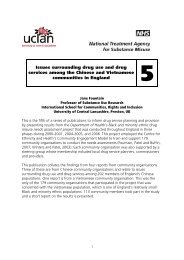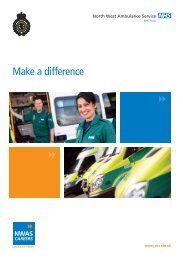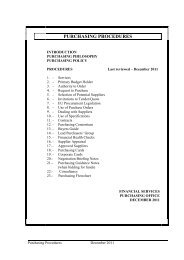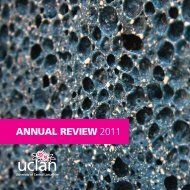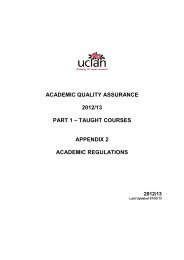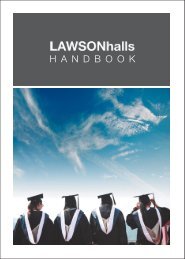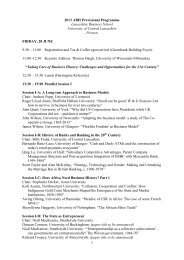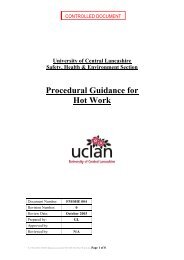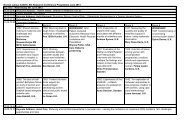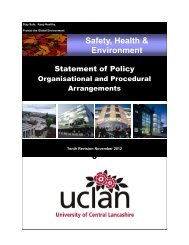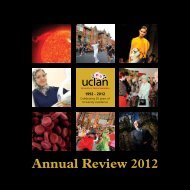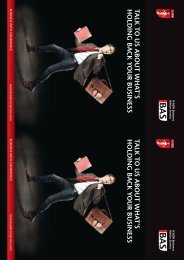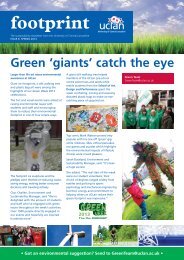Researcher development framework consultation Briefing paper
Researcher development framework consultation Briefing paper
Researcher development framework consultation Briefing paper
You also want an ePaper? Increase the reach of your titles
YUMPU automatically turns print PDFs into web optimized ePapers that Google loves.
<strong>Researcher</strong> <strong>development</strong> <strong>framework</strong> <strong>consultation</strong><br />
<strong>Briefing</strong> <strong>paper</strong><br />
<strong>Researcher</strong> <strong>development</strong> <strong>framework</strong> briefing <strong>paper</strong>.................................................. 2<br />
Summary ..................................................................................................................... 2<br />
Background................................................................................................................. 3<br />
Aims of the project..................................................................................................... 4<br />
Scope of the researcher <strong>development</strong> <strong>framework</strong> .................................................. 4<br />
How the <strong>framework</strong> will be used............................................................................... 5<br />
Approach..................................................................................................................... 6<br />
Reviews of literature .................................................................................................. 7<br />
Relationship with Joint Skills Statement ................................................................. 7<br />
Boundaries of the <strong>Researcher</strong> <strong>development</strong> <strong>framework</strong>........................................ 8<br />
Outline <strong>framework</strong>...................................................................................................... 9<br />
The stages of the career <strong>development</strong> of researchers........................................ 9<br />
Domains/sub-domains/descriptors (row headings of the RDF) ....................... 10<br />
Proficiency phases (column headings of the RDF) ........................................... 13<br />
The link between the <strong>framework</strong> phases and career <strong>development</strong> stages ..... 13<br />
Future <strong>development</strong> ................................................................................................. 15<br />
Next steps ................................................................................................................. 16<br />
Appendix 1: <strong>Researcher</strong> <strong>development</strong> <strong>framework</strong> domain structure..................... 17
<strong>Researcher</strong> <strong>development</strong> <strong>framework</strong> briefing <strong>paper</strong><br />
Summary<br />
This <strong>paper</strong> presents a proposal for a <strong>Researcher</strong> <strong>development</strong> <strong>framework</strong>. It describes the<br />
rationale behind creating the <strong>framework</strong>, the approach to its <strong>development</strong>, the structure and<br />
content of the proposed draft <strong>framework</strong> and the <strong>consultation</strong> process.<br />
The proposed <strong>Researcher</strong> <strong>development</strong> <strong>framework</strong> has been created as a tool for planning,<br />
promoting and supporting the personal, professional and career <strong>development</strong> of researchers in<br />
higher education. It describes the knowledge, skills, behaviours and personal qualities of<br />
researchers and encourages researchers to aspire to excellence through achieving higher<br />
levels of <strong>development</strong>. It will be of value to anyone conducting research in higher education,<br />
whether this is their main role or part of a wider remit.<br />
The proposed <strong>framework</strong> is designed to be aspirational, yet realistic, identifying both the<br />
descriptors of good researchers and how to progress to the next phase within individual<br />
descriptors. It acknowledges that all researchers will be at different positions in terms of their<br />
current <strong>development</strong>, activities and aspirations so may be selective in how and why they use it.<br />
The RDF allows for flexible use by researchers and does not presume a linear progression<br />
either across the phases of the <strong>framework</strong> itself or in terms of career <strong>development</strong>; the design<br />
of the <strong>framework</strong> accommodates personal aspirations and assumes an individual may enter<br />
and leave research at any time.<br />
The <strong>framework</strong> has been built from empirical data collected through interviewing researchers to<br />
identify the characteristics of good and excellent researchers. The shape of the <strong>framework</strong> has<br />
been defined in response to the findings of the empirical research, using insights from a review<br />
of literature on comparable <strong>framework</strong>s and contributions from a range of stakeholders.<br />
The proposed <strong>framework</strong> incorporates all of and is an evolution of the 2001 Joint Statement of<br />
the UK Research Councils' Training Requirements for Research Students (JSS) 1 covering a<br />
longer period of the research career than the JSS’s snapshot, and broadening the range of<br />
descriptors, ie, including skills, knowledge, behaviours, qualities and attitudes.<br />
The <strong>framework</strong> is structured around a matrix composed of four comprehensive domains,<br />
thirteen sub-domains and associated descriptors, each with phases of <strong>development</strong>. Its aim is<br />
to encourage researchers to aspire to excellence through achieving higher levels of<br />
<strong>development</strong>.<br />
The project is funded and project-managed by Vitae and builds upon initial work by the Rugby<br />
Team 2 and precursor projects at the University of Manchester 3 and Glasgow Caledonian<br />
University 4 . The <strong>framework</strong> has also been informed by the input of various stakeholder groups<br />
and feedback from the Vitae researcher <strong>development</strong> conference in September 2009.<br />
1 Joint Statement of the UK Research Councils' Training Requirements for Research Students (JSS)<br />
www.vitae.ac.uk/jss<br />
2 Vitae Roberts Policy Forum workshop, Prof Pam Denicolo, University of Reading, Rob Daley, Heriot-Watt University<br />
Daley www.vitae.ac.uk/rdf<strong>consultation</strong><br />
3 Academic competencies, 2008, Dr Maria Nevada, University of Manchester, Dr Julie Reeves, (now) University of<br />
Southampton www.vitae.ac.uk/rdf<strong>consultation</strong><br />
4 The Glasgow Caledonian University <strong>Researcher</strong> Skills Map Project, 2008, Prof Bonnie Steves, Calum Webster and<br />
the generic leadership <strong>framework</strong> in Webster, C 2007 ‘Glasgow Caledonian University Leadership Development<br />
Centre Workbook’, Glasgow Caledonian University www.vitae.ac.uk/rdf<strong>consultation</strong><br />
Vitae®, © The Careers Research and Advisory Centre (CRAC) Limited<br />
2
Background<br />
The importance of developing highly skilled researchers and promoting the value of research<br />
careers to build our research capacity and ensure our economic and cultural prosperity has<br />
been well recognised. The 2005 launch of the European Charter for <strong>Researcher</strong>s and Code of<br />
Conduct for their recruitment 5 , and the revision of the UK Concordat to Support the Career<br />
Development of <strong>Researcher</strong>s 6 are evidence of a growing requirement to establish the career of<br />
‘researcher’ as a valued professional occupation.<br />
Implicit in the researcher <strong>development</strong> agenda, is an understanding of the skills that<br />
researchers need to develop. For postgraduate researchers this is currently articulated in the<br />
Joint Statement of the UK Research Councils' Training Requirements for Research Students<br />
(JSS), which has been incorporated into the Quality Assurance Agency’s Code of Practice for<br />
research degree programmes 7 . For research staff there is no equivalent national statement,<br />
although a few HEIs have developed internal models. Currently, the only national reference is<br />
the JNCHES 8 academic role profiles for research roles, which focuses on job descriptions<br />
rather than personal and professional skills <strong>development</strong>.<br />
The 2006 scoping study for RCUK for a research career mapping tool to enable researchers to<br />
access key information, advice and guidance about research careers identified the importance<br />
of a national <strong>framework</strong> for researchers and research careers.<br />
‘A fundamental issue that has repeatedly emerged throughout this project is the lack of clarity<br />
about what constitutes a research job/career, and about the defining characteristics of a<br />
‘researcher’. There is no overarching ‘<strong>framework</strong>’ on which to contextualise the mapping of<br />
research careers.’ 9<br />
This lack of <strong>framework</strong> for research careers was also recognised at the 2005 UK Presidency<br />
conference launching the European Charter for <strong>Researcher</strong>s and the Code of Conduct for their<br />
Recruitment 10 . The outputs from the conference stressed the need for ’substantial cultural<br />
change in the way researchers are perceived, managed and conduct themselves. The<br />
recognition of research as a profession - with researchers recognised as well as recognising<br />
themselves as professionals - is a key aspect of this change in perspective’. The conference<br />
also acknowledged ‘the diversity of career paths and the diversity of those involved in research<br />
by recognising there are a multiplicity of visions of research careers and researchers’.<br />
The 2008 Roberts Policy Forum 11 and subsequent <strong>consultation</strong> by the Rugby Team 12 endorsed<br />
the importance of developing an ‘overarching competency <strong>framework</strong>/model of professional<br />
learning that builds on the Joint Skills Statement’.<br />
5<br />
European Charter for <strong>Researcher</strong>s and Code of Conduit for their Recruitment, 2005, European Commission,<br />
http://ec.europa.eu/eracareers/pdf/am509774CEE_EN_E4.pdf<br />
6<br />
Concordat to Support the Career Development of <strong>Researcher</strong>s, 2008, www.researchconcordat.ac.uk<br />
7<br />
Code of practice for the assurance of academic quality and standards in higher education, Section 1: Postgraduate<br />
research programmes, 2004, Quality Assurance Agency (QAA),<br />
www.qaa.ac.uk/academicinfrastructure/codeOfPractice/section1/default.asp<br />
8<br />
Joint National Committee of Higher Educational Staff (JNCHES) www.ucea.ac.uk/en/New_JNCHES/<br />
9<br />
Research Career Mapping Tool Report, 2006, CRAC/UK GRAD Programme (now Vitae),<br />
www.vitae.ac.uk/CMS/files/upload/RCMT-project-report-March-2006.pdf<br />
10<br />
The European Charter for <strong>Researcher</strong>s and the Code of Conduct for their Recruitment conference, Report of<br />
proceedings, 2005, www.vitae.ac.uk/policy-practice/2667/European-Charter-and-Code.html#proceed<br />
11<br />
Roberts Policy Forum report, 2008, Vitae, www.vitae.ac.uk/CMS/files/upload/UK-GRAD-policy-forum-reportjanuary-2008.pdf<br />
12<br />
Defining researchers’ skills – developing an overarching competency <strong>framework</strong>, 2008, Rugby Team,<br />
www.vitae.ac.uk/cms/files/RT-<strong>consultation</strong>-competency-<strong>framework</strong>-Mar-08.doc<br />
3<br />
Vitae®, © The Careers Research and Advisory Centre (CRAC) Limited
It was suggested that this should include:<br />
� the complete researcher continuum from postgraduate researcher to research staff to<br />
principal investigator/supervisor<br />
� the complete breadth of the academic role: research, teaching and learning, career<br />
<strong>development</strong>, knowledge transfer, etc<br />
� include competencies/skills, behaviours and build in different phases of <strong>development</strong><br />
related to research career stages, with clearly defined entry and exit points<br />
� be informed by the requirements of different job roles/functions as appropriate during a<br />
research career<br />
� be flexible enough to:<br />
- allow individuals to take different routes through the <strong>framework</strong><br />
- recognise varied learning styles and approaches to <strong>development</strong><br />
- take into account differences between disciplines in how these competencies might be<br />
described<br />
- provide opportunities for local variability in content, e.g. specialist topics.<br />
The implementation of the <strong>Researcher</strong> <strong>development</strong> <strong>framework</strong> and subsequent <strong>development</strong><br />
of associated tools for skills assessment and analyses of <strong>development</strong> needs and linked<br />
provision of <strong>development</strong> opportunities will be an important contribution to achieving the aims of<br />
the UK Concordat to Support the Career Development of <strong>Researcher</strong>s.<br />
Aims of the project<br />
The proposed <strong>Researcher</strong> <strong>development</strong> <strong>framework</strong> is designed to be a tool for planning,<br />
promoting and supporting the personal, professional and career <strong>development</strong> of researchers. It<br />
describes the knowledge, skills, behaviours and personal qualities of researchers and<br />
encourages researchers to aspire to excellence through achieving higher levels of<br />
<strong>development</strong>.<br />
Primarily, the <strong>framework</strong> is designed for:<br />
� researchers within higher education to evaluate and plan their own personal, professional<br />
and career <strong>development</strong><br />
� managers/supervisors of researchers in their role supporting the <strong>development</strong> of<br />
researchers<br />
� trainers, developers, human resources specialists and careers advisors in the planning and<br />
provision of support for researchers’ <strong>development</strong><br />
� institutions in making decisions about their strategic approach to <strong>development</strong> of<br />
researchers.<br />
The <strong>framework</strong> will also be of use for:<br />
� funders of researchers and other stakeholders with an interest in the <strong>development</strong> of<br />
researchers<br />
� non-higher education employers in identifying the benefits of employing researchers<br />
� people interested in training as a researcher or researchers looking to move into higher<br />
education from other sectors.<br />
Scope of the researcher <strong>development</strong> <strong>framework</strong><br />
The <strong>framework</strong> presents the generic descriptors common to researchers in higher education. It<br />
addresses different stages of being a researcher in higher education including:<br />
� training to be a researcher, specifically studying for a doctoral level qualification<br />
� being employed to do research<br />
� being an independent researcher or research leader.<br />
Vitae®, © The Careers Research and Advisory Centre (CRAC) Limited<br />
4
The <strong>framework</strong> seeks to describe characteristics of anyone conducting research in UK higher<br />
education whether this is their primary role or one of a number of roles they perform. It is likely<br />
that as researchers progress through their careers they will conduct research as part of a<br />
portfolio of responsibilities, for example combining research and teaching. Although focussed<br />
on research activities, the <strong>framework</strong> also contains other activities related to research that may<br />
or may not be undertaken by individual researchers within higher education.<br />
The intention is that the <strong>framework</strong> will be aspirational, yet realistic: identifying both the<br />
descriptors of good researchers and how to progress to the next phase within individual<br />
descriptors. It makes no judgement about the career choices researchers make, but instead<br />
encourages researchers to strive for excellence thereby improving their potential to achieve<br />
their career aspirations regardless of what these might be.<br />
Many people will work as a researcher in higher education only for part of their career, and the<br />
<strong>framework</strong> is designed to be useful for all researchers regardless of previous experience or<br />
career aspiration. The <strong>framework</strong> acknowledges that all researchers will be at different positions<br />
in terms of their current <strong>development</strong>, activities and aspirations so may be selective in how and<br />
why they use it.<br />
Although the <strong>framework</strong> is based on the current research environment within UK higher<br />
education, it also attempts to anticipate how this may change over the next ten years through to<br />
2020. It is expected that the <strong>framework</strong> may need to evolve in response to changes in the<br />
research environment.<br />
The <strong>framework</strong> uses language that works for researchers and will enable researchers to<br />
develop a lexicon for describing the qualities that they can offer as an employee.<br />
How the <strong>framework</strong> will be used<br />
The <strong>framework</strong> is designed as a tool for researchers and anyone else with an interest in the<br />
personal, professional and career <strong>development</strong> of researchers. It is accepted that it will be used<br />
in many different ways and how it is used will rightly be decided by researchers themselves and<br />
their managers, trainers and advisors.<br />
However, the <strong>framework</strong> has been designed with the specific intention that it will be useful for:<br />
� researchers planning their own personal, professional or career <strong>development</strong> within<br />
research roles in HE<br />
� researchers identifying their own qualities and presenting these effectively in job<br />
applications within or beyond research in HE<br />
� staff developers, Roberts trainers or training consultants designing training courses and<br />
planning training programmes for researchers<br />
� careers advisors planning/conducting career interviews with researchers<br />
� supervisors, principal investigators or mentors discussing personal, professional or<br />
career <strong>development</strong> with researchers<br />
� institutions in developing their institutional strategies to support the training and career<br />
<strong>development</strong> of researchers<br />
� employers from beyond the HE research sector to understand the value of recruiting<br />
people with research backgrounds.<br />
For any of these purposes it is likely that further work will need to be undertaken to develop<br />
tools to support this use of the <strong>framework</strong>, and this will be part of Vitae’s further work once the<br />
<strong>framework</strong> has been finalised and launched.<br />
Vitae®, © The Careers Research and Advisory Centre (CRAC) Limited<br />
5
No attempt has been made to specifically tailor the <strong>Researcher</strong> <strong>development</strong> <strong>framework</strong> to the<br />
following uses, and it is unlikely that it will be suitable for these uses in its current form:<br />
� creation of job descriptions, person specifications or selection procedures for research<br />
posts<br />
� academic promotion procedures<br />
� job evaluation exercise<br />
� performance appraisal linked to role profiles<br />
Specifically the <strong>Researcher</strong> <strong>development</strong> <strong>framework</strong> has not been designed to link explicitly to<br />
national or local role profiles developed in line with the Joint Negotiating Committee for Higher<br />
Education Staff (JNCHES) Framework Agreement for the Modernisation of Pay Structures<br />
(2001) (also see page 8 below).<br />
Approach<br />
The <strong>Researcher</strong> <strong>development</strong> <strong>framework</strong> project is funded and project-managed by Vitae. The<br />
project team includes members of the Rugby Team 13 and other key stakeholders. An Advisory<br />
group, chaired by Professor April McMahon, University of Edinburgh also supports the project.<br />
Membership of both groups can be found at www.vitae.ac.uk/rdf<strong>consultation</strong>. The project builds<br />
upon some initial work by the Rugby Team 14 to develop the methodology and the precursor<br />
projects at the University of Manchester 15 and Glasgow Caledonian University 16 .<br />
The <strong>framework</strong> has been developed from first principles using empirical data generated from<br />
analysis of semi-structured interviews with researchers. The base data from the interviews from<br />
the two institutional projects were combined with data collected from a series of additional<br />
interviews to ensure a sufficiently representative sample and comprehensive coverage of the<br />
range of researcher activities. In total 81 interviews were conducted with researchers covering a<br />
range of experiences, institutions, disciplines and demographics.<br />
Predominately, interviews were undertaken with researchers with sufficient experience of<br />
several stages of the research career. They were asked to identify the characteristics of good,<br />
excellent and underperforming researchers at various stages of their career. The majority of<br />
interviewees were also asked to envision the characteristics researchers will require in the<br />
future. Subsequent transcription and analysis of the interviews using a phenomenographic<br />
approach identified more than 1000 characteristics and their variants.<br />
The characteristics identified through the interviews were reviewed and clustered into groups<br />
where commonalities were found, producing a set of descriptors. To facilitate navigation the<br />
descriptors have been structured into four comprehensive domains and sub-domains (see<br />
Table 2). More details on the methodology and how data from the institutional projects have<br />
13<br />
The Rugby Team is a HE sector-led group whose remit is to evaluation the effectiveness of skill <strong>development</strong> of<br />
researchers.<br />
14<br />
Vitae Roberts Policy Forum workshop, Prof Pam Denicolo, University of Reading, Rob Daley, Heriot-Watt<br />
University Daley www.vitae.ac.uk/CMS/files/upload/Vitae-Policy-Forum-Developing-a-<strong>framework</strong>-of-researcherattributes-January-2009.pdf<br />
15<br />
Academic competencies, 2008, Dr Maria Nevada, University of Manchester, Dr Julie Reeves, (now) University of<br />
Southampton<br />
16<br />
The Glasgow Caledonian University <strong>Researcher</strong> Skills Map Project, 2008, Prof Bonnie Steves, Calum Webster<br />
and the generic leadership <strong>framework</strong> in Webster, C 2007 ‘Glasgow Caledonian University Leadership Development<br />
Centre Workbook’, Glasgow Caledonian University<br />
6<br />
Vitae®, © The Careers Research and Advisory Centre (CRAC) Limited
een incorporated into the process of developing the <strong>framework</strong> are available on the project<br />
website 17 .<br />
Reviews of literature<br />
An initial literature survey 18 identified existing relevant skills, attributes and competencies based<br />
on definitions of research and the role of researchers. A second review 19 explored existing<br />
competency <strong>framework</strong>s and their <strong>development</strong>, looking at both the academic literature and<br />
relevant example <strong>framework</strong>s for researchers and related occupations. This was used to inform<br />
the <strong>development</strong> of the structure and shape of the <strong>framework</strong>.<br />
Relationship with Joint Skills Statement<br />
The Joint Skills Statement (JSS) was jointly issued by the UK research councils in 2001. It sets<br />
out the skills and attributes that doctoral researchers are expected to develop during their<br />
postgraduate research degree programmes. The <strong>development</strong> of the JSS was groundbreaking<br />
in providing a <strong>framework</strong> and language, irrespective of discipline, to articulate postgraduate<br />
researchers’ skills. It has been embedded in the QAA Code of Practice for Research Degree<br />
Programmes and within the Roberts’ agenda 20 , which focuses on the skills <strong>development</strong> of<br />
sections D-G of the JSS: personal effectiveness, communication skills, networking and team<br />
working, and career <strong>development</strong>. The JSS has been used extensively by institutions to map<br />
their provision of skills <strong>development</strong> opportunities and to create personal <strong>development</strong> tools for<br />
postgraduate researchers.<br />
However, the higher education sector and the research councils have recognised that it has<br />
effectively become the baseline and we need to move beyond it. It now needs to reflect the<br />
broader range of skills, for example, leadership, creativity, enterprise, which are required to be<br />
an effective researcher and employee in a world driven by knowledge production and<br />
innovation.<br />
Furthermore, the JSS is a snapshot at the completion of a doctorate. For it to function<br />
effectively to support the <strong>development</strong> of researchers it needs to evolve to include how<br />
researchers can improve their proficiency and career opportunities within the academic sector<br />
and beyond.<br />
However, the JSS has been instrumental in ensuring a focus on transferable skills <strong>development</strong><br />
for postgraduate researchers as well as being an invaluable tool for researchers and those<br />
supporting their <strong>development</strong> in providing a ‘<strong>framework</strong>’ around which activities can take place.<br />
An important part of the <strong>development</strong> of the <strong>framework</strong> is to manage the transition from the JSS<br />
to its successor.<br />
All the skills and attributes of the JSS have been incorporated into the <strong>framework</strong> and<br />
highlighted against the <strong>Researcher</strong> <strong>development</strong> <strong>framework</strong> descriptors for reference (see the<br />
worked example in Table 3). A mapping of the JSS against the <strong>framework</strong> and vice versa is<br />
available on the RDF website 21 .<br />
17<br />
Methodology for the <strong>development</strong> of the <strong>Researcher</strong> <strong>development</strong> <strong>framework</strong>, 2009, Vitae,<br />
www.vitae.ac.uk/rdf<strong>consultation</strong><br />
18<br />
Initial survey of the literature relating to the skills, competences and attributes of researchers, 2009, Dr Anne Lee,<br />
University of Surrey, www.vitae.ac.uk/rdf<strong>consultation</strong><br />
19<br />
Review of literature relating to competency <strong>framework</strong>s for researchers, 2009, Shaharazad Abuel-Ealeh, CRAC,<br />
www.vitae.ac.uk/rdf<strong>consultation</strong><br />
20<br />
www.vitae.ac.uk/roberts<br />
21<br />
JSS and RDF mapping, www.vitae.ac.uk/rdf<strong>consultation</strong><br />
7<br />
Vitae®, © The Careers Research and Advisory Centre (CRAC) Limited
Two important stakeholders in the transition from the JSS to the <strong>Researcher</strong> <strong>development</strong><br />
<strong>framework</strong> are the QAA and the research councils. The QAA have given their agreement in<br />
principle to incorporating the <strong>Researcher</strong> <strong>development</strong> <strong>framework</strong>, as a replacement to the JSS,<br />
into the next revision of Section One of their Code of Practice 22 . Research Councils UK have<br />
welcomed the <strong>Researcher</strong> <strong>development</strong> <strong>framework</strong> project as a contribution to the<br />
implementation of the Concordat to Support the Career Development of <strong>Researcher</strong>s, and in<br />
principle have agreed to adopt the RDF as a replacement for the Joint Skills Statement for<br />
postgraduate researchers, also noting that the <strong>framework</strong> also covers research staff.<br />
Boundaries of the <strong>Researcher</strong> <strong>development</strong> <strong>framework</strong><br />
The researcher <strong>development</strong> <strong>framework</strong> is designed to be a tool for planning, promoting and<br />
supporting the personal, professional and career <strong>development</strong> of researchers. It describes the<br />
knowledge, skills, behaviours and personal qualities of researchers and encourages<br />
researchers to aspire to excellence through achieving higher levels of <strong>development</strong>.<br />
The <strong>framework</strong> covers descriptors that are relevant to research success in higher education.<br />
However, this does not imply that all researchers will want to, or can, progress in higher<br />
education. Trained researchers, especially doctoral graduates, are employed in all employment<br />
sectors covering a wide range of occupations 23 . About half of all doctoral graduates are<br />
employed outside higher education on graduation.<br />
Many researchers aspire to a career in higher education 24 . However, there are very few<br />
research only paths in higher education and significant competition for teaching and research<br />
posts. <strong>Researcher</strong>s do make careers employed as research staff in higher education, usually<br />
employed on fixed term contracts and dependent on grant funding. The anticipation is that the<br />
<strong>framework</strong> will inspire all researchers to improve their abilities as a researcher, irrespective of<br />
their position.<br />
The <strong>Researcher</strong> <strong>development</strong> <strong>framework</strong> is not a <strong>framework</strong> for academic practice, and so for<br />
those researchers employed in combined teaching and research roles, it does not cover the<br />
descriptors relevant for teaching success. These are contained within the existing HEA<br />
<strong>framework</strong> 25 for teaching and learning.<br />
It is has not been designed for creating job descriptions, person specifications or appraisal<br />
systems for researchers. However, it is hoped that the <strong>framework</strong> will complement or inform<br />
institutional job descriptions, such as those developed using the JNCHES academic role<br />
profiles, HERA and Hay. There are correlations with the JNCHES academic role profiles,<br />
particularly at phases 1 and 2, but it does not map exactly. Additionally, the <strong>framework</strong> may be<br />
useful to inform the career <strong>development</strong> aspects of appraisals. The ambition is that using the<br />
<strong>framework</strong> as a tool for <strong>development</strong> will lead to successful career progression.<br />
The anticipation is that the <strong>framework</strong> also will have some relevance for researchers and the<br />
research environment beyond higher education.<br />
The <strong>framework</strong> presents the generic descriptors common to all researchers. It does not cover<br />
any discipline specific knowledge or skills. It is anticipated that relevant organisations and<br />
22<br />
The QAA are currently evaluating the Academic Infrastructure. How the successor to the JSS is incorporated into<br />
Section One of the ten sections of the Code of Practice, part of the Academic Infrastructure, will depend on the<br />
outcomes of this evaluation.<br />
23<br />
What do researchers do? Vitae, 2009, www.vitae.ac.uk/wdrd,<br />
24<br />
Careers in Research Online Survey (CROS) UK aggregate results, 2009, Vitae, www.vitae.ac.uk/cros<br />
25<br />
Higher Education Academy Professional Standards Framework for teaching and learning,<br />
www.heacademy.ac.uk/ourwork/policy/<strong>framework</strong><br />
8<br />
Vitae®, © The Careers Research and Advisory Centre (CRAC) Limited
groups may wish to translate the <strong>framework</strong> into more discipline-specific language and context<br />
as appropriate. For example, an intrapreneurship project team 26 is considering the implications<br />
of looking at the <strong>framework</strong> through an intrapreneurial ‘lens’.<br />
Outline <strong>framework</strong><br />
The <strong>Researcher</strong> <strong>development</strong> <strong>framework</strong> is designed to be able to give support and guidance to<br />
researchers in the planning of their <strong>development</strong> as a researcher at different stages. It gives<br />
generic descriptors that are common to all researchers that are collected into easily searchable<br />
domains and sub-domains. It also defines a progression of <strong>development</strong> through five phases<br />
within each individual descriptor. Thus, the Research <strong>development</strong> <strong>framework</strong> contains layers of<br />
<strong>development</strong> that were absent from the JSS. The domains, sub-domains of descriptors and<br />
stages of the career <strong>development</strong> of researchers are explained below.<br />
The stages of the career <strong>development</strong> of researchers<br />
We have used a ‘one plus four’ model of career <strong>development</strong> for researchers. The first stage,<br />
‘new researcher’, represents the apprenticeship or training stage, followed by four further<br />
stages of <strong>development</strong>: the researcher (beginning), the established researcher, the advanced<br />
researcher and the eminent researcher 27 . See Table 1 for a description of each stage of the<br />
research career.<br />
Stage Description<br />
New researcher � <strong>Researcher</strong> in training, new doctoral candidate or early career<br />
research assistant<br />
<strong>Researcher</strong> Newly qualified researcher<br />
� Early career researcher, in the first years of employment as a<br />
researcher<br />
� Those who are close to completing or have recently completed a<br />
doctorate but have not yet established a significant level of<br />
independence<br />
� Other researchers with equivalent level of experience, such as<br />
technical/research laboratory staff in higher education (and other<br />
private and public sectors where the doctorate is not the norm)<br />
Established researcher Postdoctoral or experienced researcher who has developed a level of<br />
independence<br />
Developing or has a national reputation within their field<br />
Advanced researcher Leader of research<br />
� <strong>Researcher</strong> who is leading in their field<br />
� Team leader of a research group<br />
Has a national reputation and is developing or has an international<br />
reputation in their field.<br />
Eminent researcher Has globally recognised eminence in their field. Is an international leader<br />
and an acknowledged world expert.<br />
Table 1: The stages of the career <strong>development</strong> for researchers<br />
26<br />
A collaborative project between Vitae, CRAC and nine higher education institutions, www.vitae.ac.uk/policypractice/92293/Intrapreneurship-project.html<br />
27<br />
This approach is consistent with the high level ‘Descriptions for researcher competencies’ being developed by the<br />
European Commission‘s Steering Group for Human Resources and Mobility Working Group, as part of the<br />
<strong>development</strong> of the European Research Area, www.vitae.ac.uk/rdf<strong>consultation</strong><br />
9<br />
Vitae®, © The Careers Research and Advisory Centre (CRAC) Limited
Domains/sub-domains/descriptors (row headings of the RDF)<br />
The descriptors of the knowledge, skills, behaviours and personal qualities of a researcher have<br />
been collected under four domains.<br />
1. Professional and intellectual attributes<br />
2. Personal effectiveness<br />
3. Research management and governance<br />
4. Impact and influence<br />
Each domain has further sub-domains containing similar descriptors. There are many ways to<br />
group the original characteristics of researchers into domains and sub-domains. We have<br />
attempted to group the descriptors into domains recognisable to the broad researcher<br />
community. We have listed each descriptor only once, even though it might naturally fall under<br />
several sub-domains. The aim was to provide a comprehensive listing of the descriptors that<br />
was easily recognisable and searchable via domains and sub-domains. Table 2 presents the<br />
domains, sub-domains and a general explanation of content. The full list of descriptors is given<br />
in Appendix 1.<br />
Vitae®, © The Careers Research and Advisory Centre (CRAC) Limited<br />
10
Domains Sub-domains Summary description JSS<br />
Knowledge base Subject expertise and knowledge of the field and advances within it, contributes to knowledge. Knowledge and A3, A4, B6,<br />
Professional<br />
ability to implement the methods, techniques and/or instruments appropriate for research design. Literate, C2, C3, C4,<br />
and<br />
numerate and competent in languages. Identifies, designs and executes systems for the acquisition and E1<br />
Intellectual<br />
collation of information using appropriate technology.<br />
Attributes Cognitive skills Ability to analyse, think critically, synthesise, evaluate and problem solve. A1, A2, A5,<br />
A6<br />
Creativity Thinks in a creative, imaginative and inquiring way. Open and questioning style of learning. Able to take D1, D2, D3,<br />
intellectual risks and argues constructively. Demonstrates intellectual effort and innovative approaches. D7*, E3<br />
Personal qualities Approaches research with enthusiasm and confidence. Has passion, drive and ambition; is resilient and can B3, D5<br />
Personal<br />
persevere in the face of obstacles. Is self-reflective and takes responsibility for managing wellbeing of self and<br />
Effectiveness<br />
others. Is responsible and honest.<br />
Self-organisation Plans, prioritises and conducts research in proactive way; meets deadlines and delivers results. Has strategic D6, D7*<br />
approach to research, is focused yet flexible, responsive to change and self-reliant.<br />
Career <strong>development</strong> Demonstrates commitment to CPD and actively seeks to enhance own employability. Maintains relevant and B7*, D4,<br />
current career management skill set. Actively networks for career purposes and seeks to enhance research G1, G2,<br />
reputation and esteem through dissemination.<br />
G3, G4<br />
Professional conduct Conducts oneself with professional integrity in respect of all aspects of research. Respects, upholds and B2, B4<br />
Research<br />
meets professional standards and requirements.<br />
Organisation Project management Applies project management tools and techniques; plans and manages resources. Effectively assesses and C1<br />
and<br />
and delivery<br />
manages risks; evaluates research projects to deliver results.<br />
Governance Finance, funding and Understands the requirement for income generation and the processes of funding applications and financial B5<br />
resources<br />
management; aware of range of funding sources and makes applications. Manages a variety of resources and<br />
adapts to the needs of the infrastructure.<br />
Communicating Communicates effectively in different modes and media. E2<br />
Impact and effectively<br />
Influence Working with others Has constructive interactions with others; collegial, approachable and a listener. Builds relationships,<br />
E5, F1, F2,<br />
and leadership appreciates a range of team roles and own part in team success. Manages conflict and leads by example. F3<br />
Develops the potential of others, a networker who establishes and maintains networks for support and research<br />
purposes; exercises influence where appropriate.<br />
Relating to the Has broad and diverse knowledge and is able to work across disciplines; is politically aware. Understands and B1<br />
broader context responds to the organisational, operational, cultural and environmental context and wider impact of research.<br />
Accepts accountability of research with regard to social and economic contexts, internationalisation and global<br />
citizenship.<br />
Application of Engages in, and shares research through, teaching, public engagement, enterprise and/or entrepreneurial E4, B7*<br />
research<br />
activities. Aware of influence and application of research to policy.<br />
*Denotes where a JSS descriptor has been separated in the RDF<br />
Table 2: <strong>Researcher</strong> <strong>development</strong> <strong>framework</strong> domains and sub-domains<br />
11<br />
Vitae®, © The Careers Research and Advisory Centre (CRAC) Limited
Proficiency phases (column headings of the RDF)<br />
The proposed <strong>Researcher</strong> <strong>development</strong> <strong>framework</strong> presents five proficiency phases illustrating<br />
the <strong>development</strong>al progression for each descriptor. Not all descriptors necessarily will have a<br />
listing for each of the five phases of <strong>development</strong>. For example, some fundamental descriptors<br />
might only need <strong>development</strong> up to phase three, at which point these traits would have been<br />
acquired and should be sustained rather than changed. In contrast, descriptors that describe<br />
the behaviour or skills of leaders, for example, might only start at phase three and develop up to<br />
phase five.<br />
Every phase is a progression from the previous phase. The descriptors are thus meant to be<br />
accumulative, e.g. attainment of phase five should include attainment of all descriptors from<br />
phase one through to five. (Table 3 presents an example of descriptors by phase.)<br />
The link between the <strong>framework</strong> phases and career <strong>development</strong> stages<br />
The original descriptors have been gathered from interviews seeking the knowledge, skills,<br />
behaviours and personal qualities that make a good researcher and an excellent researcher at<br />
different stages in a research career. Broadly, each phase gives the standard for a good<br />
researcher, while the next phase above, lists the behaviours that the researcher could aspire to,<br />
to become an excellent researcher.<br />
A ‘typical’ (as an ideal type) researcher might be expected to encompass two proficiency<br />
phases as illustrated by Figure 1 below. Thus for example, for a new researcher, and for a<br />
particular descriptor (row), phase one gives the traits that a good ‘new researcher’ might be<br />
expected to have; while phase two gives the traits to which the excellent ‘new researcher’ could<br />
aspire.<br />
Figure 1 shows generally how each pair of phases relates to the good and aspirational<br />
researcher in each phase of a research career. However, this is only for guidance and should<br />
not be viewed as a prescriptive model. An individual researcher, who generally might be<br />
classed as being in one of the five stages of a research career, will normally be working at<br />
different phases in each of the descriptors. Thus a researcher should not be expected to always<br />
fall into one specific phase/column and progress from one column to the next as a whole.<br />
For example, it is not expected that everyone embarking on their first research project (i.e. as a<br />
research assistant or doctoral candidate) will enter the <strong>framework</strong> at phase 1 for all the<br />
descriptors. Many professional doctorates, for example, and those with prior experience are<br />
likely to identify themselves at later phases for many of the descriptors.<br />
Although it is assumed that researchers will want to be as accomplished as possible within any<br />
role they have, it is also not presumed that all researchers can or will want to move on to later<br />
career stages. Research positions in higher education are very competitive and very few<br />
researchers will ever become eminent researchers.<br />
Vitae®, © The Careers Research and Advisory Centre (CRAC) Limited<br />
13
Descriptors<br />
Proficiency<br />
indicator<br />
Descriptor 1<br />
Descriptor 2<br />
…<br />
New researcher<br />
Good Excellent<br />
<strong>Researcher</strong><br />
Good Excellent<br />
Established researcher<br />
Good Excellent<br />
Advanced researcher<br />
Good Excellent<br />
Eminent<br />
researcher<br />
Phase 1 Phase 2 Phase 3 Phase 4 Phase 5<br />
Figure 1. The link between the phases of proficiency in each descriptor and the stages of<br />
<strong>development</strong> as a researcher<br />
For each descriptor (row), the individual should decide at what phase they are currently<br />
working. They can then look to the next phase to see how they might develop this descriptor.<br />
The intention is that the final version of the <strong>framework</strong> will contain both negative and positive<br />
characteristics, quotations from researchers, detailed examples and highlighted pathways, such<br />
as the attributes and qualities that support leadership, public engagement and teaching that will<br />
further illuminate the descriptors. A fundamental premise of the <strong>framework</strong> is that descriptors<br />
accumulate across the phases, so a researcher at phase 5 will have acquired all of the<br />
attributes in the previous four phases.<br />
Table 3 presents an example of a section of the <strong>framework</strong> showing the progression within<br />
descriptors and illustrates the alternative features of some descriptors, such as:<br />
� acquired at early phases and will not necessarily be developed further, but would improve<br />
with experience, as in ‘Time management’ and ‘Focus’<br />
� may be ‘richer’ at one end or other and/or priorities change across the phases, as in<br />
‘Strategic approach’ and ‘Response to change’<br />
� how the JSS descriptors are currently embedded in the RDF, as in ‘Self-reliance’.<br />
Vitae®, © The Careers Research and Advisory Centre (CRAC) Limited<br />
14
Domain 2: Personal effectiveness; Sub-domain: Self organisation<br />
Proficiency<br />
indicator<br />
Descriptors<br />
Time<br />
management<br />
Strategic<br />
approach<br />
Focus<br />
Response to<br />
change<br />
Self-reliance<br />
Phase 1 Phase 2 Phase 3 Phase 4 Phase 5<br />
Manages own<br />
time effectively to<br />
complete<br />
research project;<br />
sticks to clear<br />
plan.<br />
Plans project to<br />
objectives and<br />
able to adapt if<br />
necessary and<br />
with support.<br />
Commits to own<br />
project and<br />
establishes<br />
research<br />
credentials.<br />
Adapts approach<br />
with guidance<br />
when required to;<br />
carefully<br />
considers risk.<br />
Recognises<br />
boundaries and<br />
draws upon and<br />
uses sources of<br />
support as<br />
appropriate (D6)<br />
Makes timely<br />
decisions.<br />
Delivers a<br />
project on time;<br />
quick and<br />
efficient;<br />
responds<br />
flexibly.<br />
Takes strategic<br />
view of project;<br />
plans and<br />
projects forward;<br />
deals with the<br />
unexpected.<br />
Focuses on and<br />
dedicated to<br />
own research<br />
area; says no to<br />
potential<br />
distractions.<br />
Adapts to<br />
changes;<br />
balances risk<br />
and opportunity.<br />
Self-reliant (D7)<br />
Capable of<br />
directing others<br />
Vitae®, © The Careers Research and Advisory Centre (CRAC) Limited<br />
Manages multiple or complex projects to time;<br />
balancing constraints.<br />
Anticipates<br />
future directions<br />
and trends in<br />
research. Spots<br />
the good idea.<br />
Sees the gaps<br />
and<br />
opportunities<br />
and evaluates<br />
the changes<br />
needed.<br />
Prepares for the<br />
unexpected;<br />
lives with<br />
imperfections.<br />
Provides a<br />
vision for others.<br />
Sets clear<br />
direction/<br />
strategy. Gives<br />
evidence for the<br />
need for<br />
change.<br />
Plans, balances,<br />
responds rapidly<br />
and effectively;<br />
Influences<br />
environment,<br />
has long term<br />
strategic vision.<br />
Prioritises and switches focus between multiple<br />
projects/tasks;<br />
Difficult to distract when on task.<br />
Engages with<br />
change; expects<br />
change and is<br />
prepared for it,<br />
manages risk<br />
accordingly.<br />
Builds and uses<br />
own support<br />
structures<br />
effectively;<br />
contributes to<br />
others’ support.<br />
Descriptors from the Joint Skills Statement (JSS) are highlighted in blue italic text<br />
Finds change<br />
stimulating;<br />
anticipates risk.<br />
Maintains a<br />
range and<br />
variety of<br />
support<br />
structures.<br />
Independence<br />
established;<br />
recognises need<br />
for collegiality<br />
Drives change,<br />
takes personal<br />
risk.<br />
Exploits<br />
focussed and<br />
targeted support<br />
mechanisms.<br />
Table 3: Worked example of the five phases for a selection of descriptors from the subdomain<br />
‘Self organisation’ within the ‘Personal effectiveness’ domain<br />
Future <strong>development</strong><br />
Longer-term ambitions for the <strong>Researcher</strong> <strong>development</strong> <strong>framework</strong> include an interactive online<br />
version of the <strong>framework</strong> with illustrative quotations for descriptors, deeper descriptions and<br />
examples of both positive and negative behaviours (i.e. what not to do) for individual<br />
15
descriptors. The inclusion of sample pathways demonstrating how a range of individuals use<br />
sections of the <strong>Researcher</strong> <strong>development</strong> <strong>framework</strong> should serve as a practical aid to<br />
researchers, indicating the range of career variation and flexibility the <strong>framework</strong> is able to<br />
support.<br />
It is anticipated that skills assessment and needs analysis tools will be developed around the<br />
<strong>framework</strong> and resources to facilitate supervisors, principal investigators, trainers and others in<br />
supporting the personal and professional <strong>development</strong> of researchers. The <strong>framework</strong> lends<br />
itself to being linked to examples of how researchers can develop any particular descriptor.<br />
Next steps<br />
The <strong>Researcher</strong> <strong>development</strong> <strong>framework</strong> will open for wide ranging <strong>consultation</strong> with the sector<br />
and other stakeholders until 11 December 2009. Throughout this period key stakeholders will<br />
be asked to provide general and specific feedback on the <strong>framework</strong>. This will include<br />
presentations and workshops to key stakeholder groups. Responses are encouraged from both<br />
individuals and representatives of groups and organisations. The proforma for the <strong>consultation</strong><br />
response, together with the full <strong>Researcher</strong> <strong>development</strong> <strong>framework</strong> and background <strong>paper</strong>s<br />
are available at www.vitae.ac.uk/rdf<strong>consultation</strong><br />
During the <strong>consultation</strong> period focus groups will be held with both postgraduate researchers and<br />
research staff. <strong>Researcher</strong>s are invited to respond to the <strong>consultation</strong> directly through a<br />
focussed survey.<br />
Initial outcomes of the <strong>consultation</strong> and researcher focus groups will be available at the Vitae<br />
Roberts Policy Forum in January 2010. The responses to the <strong>consultation</strong> will be analysed in<br />
full during January and February and the outcomes used to inform the final drafting of the<br />
<strong>framework</strong>. The final <strong>framework</strong> will be launched at the end of March 2010.<br />
The <strong>Researcher</strong> <strong>development</strong> <strong>framework</strong> is a major <strong>development</strong>, which will take time to embed<br />
in national and institutional processes. We are proposing a reflection period of six months,<br />
during which time we will welcome further comment from all stakeholders on both the<br />
presentation and content of the <strong>framework</strong>. It is not expected that there will be major changes to<br />
the <strong>framework</strong> during this period, but that it will part of an iterative <strong>development</strong> and evaluation<br />
process to ensure that the <strong>framework</strong> is fit for purpose.<br />
Timetable for <strong>consultation</strong> and future implementation<br />
Timescale Activity<br />
Closes 11 December<br />
2009<br />
Consultation on the proposed <strong>framework</strong><br />
November/December<br />
2009<br />
Structured focus groups with key stakeholder groupings<br />
November/December<br />
2009<br />
Structured focus groups with researchers<br />
December 2009 / January<br />
2010<br />
Review of <strong>consultation</strong> responses<br />
January 2010 Update at Vitae Roberts Policy Forum<br />
January/February 2010 Revision of the <strong>Researcher</strong> <strong>development</strong> <strong>framework</strong><br />
End March 2010 Publication of <strong>Researcher</strong> <strong>development</strong> <strong>framework</strong><br />
April/October 2010 ‘Reflection period’ to confirm face validity of <strong>framework</strong><br />
November 2010 Finalisation of the <strong>Researcher</strong> <strong>development</strong> <strong>framework</strong><br />
Vitae®, © The Careers Research and Advisory Centre (CRAC) Limited<br />
16
Appendix 1: <strong>Researcher</strong> <strong>development</strong> <strong>framework</strong> domain structure<br />
Domain 1: Professional and intellectual attributes<br />
1.1 Knowledge base<br />
1. Subject knowledge<br />
2. Research methods (knowledge)<br />
3. Research methods (practice)<br />
4. Literacy<br />
5. Numeracy<br />
6. Languages<br />
7. Information seeking<br />
8. Information management<br />
1.2 Cognitive skills<br />
1. Analysis skills<br />
2. Critical thinking<br />
3. Synthesis<br />
4. Evaluation<br />
5. Problem solving<br />
1.3 Creativity<br />
1. Inquiring mind<br />
2. Intellectual effort (scholarship)<br />
3. Argument power<br />
4. Intellectual risk<br />
5. Innovation<br />
Domain 2: Personal effectiveness<br />
2.1 Personal qualities<br />
1. Enthusiasm<br />
2. Ambition<br />
3. Perseverance<br />
4. Self-confidence<br />
5. Self-reflection<br />
6. Responsibility<br />
7. Integrity<br />
2.2 Self-organisation<br />
1. Time management<br />
2. Strategic approach<br />
3. Focus<br />
4. Response to change<br />
5. Self-reliance<br />
2.3 Career <strong>development</strong><br />
1. Continued professional <strong>development</strong><br />
2. Career opportunities<br />
3. Portfolio<br />
4. Dissemination<br />
5. Authority<br />
6. Career management<br />
Vitae®, © The Careers Research and Advisory Centre (CRAC) Limited<br />
17
Domain 3: Research organisation and governance<br />
3.1 Professional conduct<br />
1. Health & safety<br />
2. Ethics<br />
3. Legal requirements<br />
4. Respect & confidentiality<br />
5. Attribution and co-authorship<br />
6. Copyright and IPR<br />
7. Appropriate practice<br />
3.2 Project management<br />
1. Project management and delivery<br />
2. Risk management<br />
3.3 Finance, funding and resources<br />
1. Income generation<br />
2. Financial management<br />
3. Infrastructure and resources<br />
Domain 4: Impact and influence<br />
4.1 Communicating effectively<br />
1. Communication modes<br />
2. Communication media<br />
4.2 Working with others and leadership<br />
1. Interacting constructively with colleagues<br />
2. Developing relationships and building teams<br />
3. Developing the potential of others<br />
4. Networking<br />
5. Influencing others<br />
4.3 Relating to the broader context<br />
1. Inter- intra- or trans-disciplinary awareness<br />
2. Organisational understanding and responsibility<br />
3. Socio-cultural and political awareness<br />
4. Environmental and physical awareness<br />
5. Global citizenship and internationalisation<br />
4.4 Application of research and knowledge exchange<br />
1. Teaching<br />
2. Public engagement<br />
3. Enterprise / entrepreneurship<br />
4. Public sector / policy<br />
Vitae®, © The Careers Research and Advisory Centre (CRAC) Limited<br />
18



